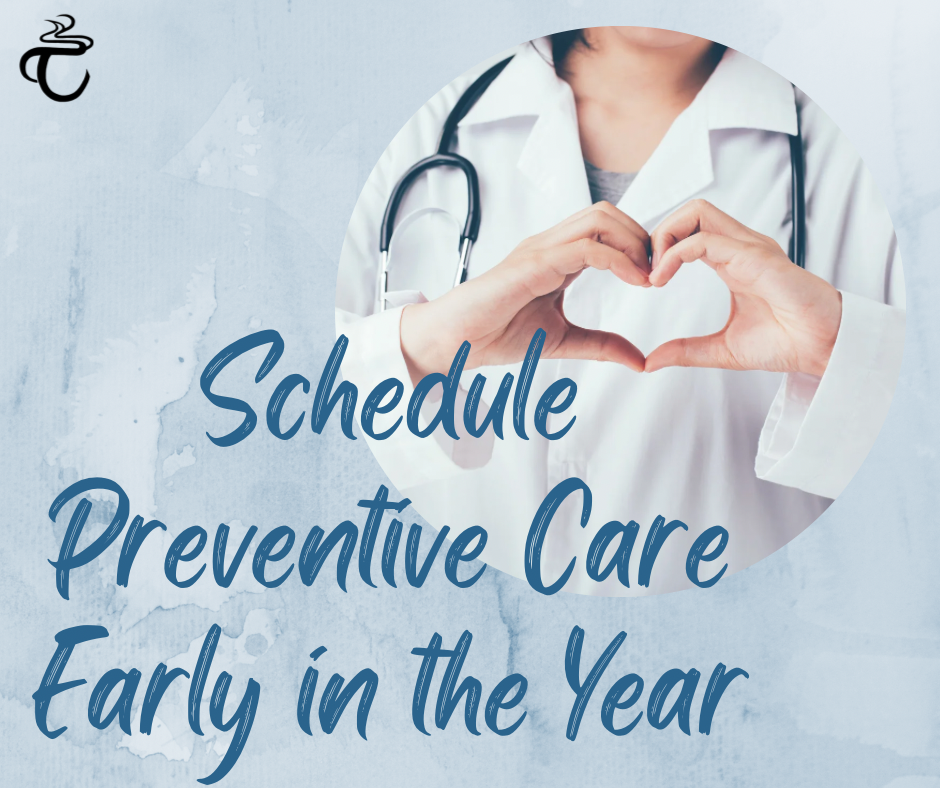If you’ve been reading my blog for a while, you know that I encourage everyone to schedule their annual appointments for preventive care early in the year. It’s dear to my heart because a routine colonoscopy could have helped my father, who passed from colon cancer seven years ago today.
Self-blame has played no small part in my grief. If only I’d tried harder to schedule an appointment for him … if only I’d taken him for it when he visited me … the mind plays evil tricks when you grieve a loved one. My doctor’s gentle reminder, that he was an adult and made his own choices, brought me to tears but also assuaged the guilt that came with his diagnosis and the awful journey that followed.
But it did spur me to action, first for myself, and then to use my platform to advocate for preventive care so others don’t have to suffer themselves or as caregivers.
Schedule Preventive Care Early in the Year
Perhaps you’re wondering why I push to schedule all your appointments in January. If you’ve put it on the calendar in January, even if the appointment is in March or June, you have time to reschedule if something comes up. But if you wait until later, those appointment slots fill up and you might not be able to squeeze in everything within the calendar year.
With the drama that comes with insurance and annual deductibles, I prefer to spend as little as possible. So the year they found something that required multiple follow-up visits and culminated in an out-patient procedure, it was nice to find resolution without worrying about paying that deductible across two years or dealing with a new insurance provider that didn’t work with the same doctors.
One other, easy way to fit all your appointments into your calendar for next year is to schedule them before you leave the office. I also like to discuss with my primary care physician, in person during my physical or through the messaging app, which appointments I’ve had and what their followup schedule looks like. This way, my physician can also hold me accountable for seeing specialists at the right interval.

What If I Don’t Have Insurance?
Preventive care is especially important when your budget limits your access to healthcare or health insurance. Just this month, I’ve had two friends identify lack of insurance as the reason for their lagging on scheduling preventive care.
Most of my reaction to this was anger and frustration at how our health is held hostage to a company entirely unattached to me or to my doctors. I had to call four different providers for a skin exam recommended by my doctor at my annual physical just to find someone covered by my insurance, and that’s with really good corporate health insurance coverage. I can’t imagine the frustration for someone struggling to find the right insurance coverage for themselves in the first place.
But I digress.
Talking to them made me realize that I was only addressing a small part of the problem. It’s relatively simple to schedule an appointment when you know your provider, when you made the appointment on your way out the door last year, and when the cost is a known quantity.
It became my mission for this post to find a solution to getting preventive care when insurance is the problem.
This hits close to home. We didn’t have health insurance when I was growing up, though my parents were able to get annual policies for me through school. We would go to community health drives, where my parents would get most of their regular health checks done. Going to specialists wasn’t something normalized to my dad, so, in retrospect, it’s not surprising that he put off getting a colonoscopy. “I feel fine,” he’d say whenever I brought it up. Of course, as I learned, colon cancer has no symptoms until it’s terminal.
So back to the matter at hand: how do you schedule preventive care early in the year or at all, when health insurance limits your access?
A great resource to consider is FreeClinics.com. For the zip codes I tested, including my own, at least ten results came up for each one. These include dentists, pediatric clinics, and women’s health providers in addition to general health services.
I also did a quick search for “free clinics near me,” “where can I get a mammogram without insurance,” and similar options. StopColonCancerNow.com provides guidance for getting a colonoscopy if you are uninsured or under-insured.
Please, please do not let lack of insurance bar you from getting the medical care you need. Our family paid the price, and it’s a steep one.
So, What Are My Action Steps?
For the TL/DR; lot, here you go.
- Call your primary care physician for your annual physical OR contact a local clinic like one suggested above to get your lab work done. Follow up as recommended.
- Ditto for the dentist and optometrist. There are some conditions your eye doctor can detect earlier than anyone else because they can see into the little veins in your eyes.
- Get a mammogram, women’s wellness exam, and skin scans annually over age 40.
- Schedule colonoscopies at 45 unless you have a family history of colon cancer. Your doctor will advise you when to come back.
Whatever you do, just plan to address preventive care early in the year!
From me to you, I wish you good health in the new year.
